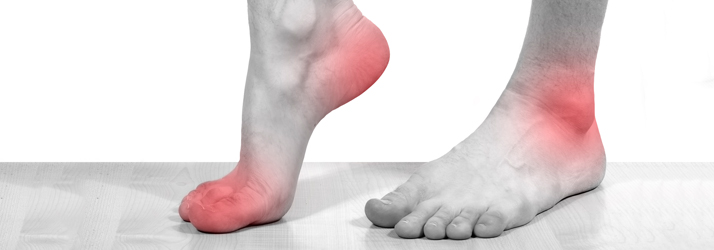PERIPHERAL NEUROPATHY IN Carroll IA

Are you experiencing challenges with neuropathy or peripheral neuropathy in Carroll, IA? Neuropathy refers to a group of disorders that occur due to damage to the peripheral nervous system, which encompasses the nerves outside the brain and spinal cord. This network of nerves connects your limbs and organs to the central nervous system. Peripheral neuropathy, also known as neuropathy, typically arises from damage to the nerve axons responsible for conducting electrical impulses. For instance, if the axon of a sensory neuron is damaged, it can lead to an impaired sense of touch and temperature. Neuropathy often manifests as pain, numbness, and tingling in the extremities, particularly the hands and feet. Several factors can cause this condition, including:
- Diabetes (the most common cause)
- Traumatic injury
- Infection
- Metabolic disorders
- Toxins
TYPES OF NEUROPATHY IN CARROLL, IA
- Sensorimotor polyneuropathy: Affects both sensory and motor nerves.
- Autonomic neuropathy: Affects nerves that control functions like breathing, heartbeat, and perspiration.
Peripheral neuropathy commonly produces sensations described as tingling, burning, and prickling. The duration and severity of pain can vary but generally improve over time, especially with appropriate treatment of the underlying condition. Neuropathy often correlates with various factors such as poor nutrition, certain diseases, nerve trauma, or pressure. In some cases, the cause is unknown, referred to as idiopathic neuropathy.
According to the Neuropathy Association, over 20 million Americans suffer from neuropathy, which is more than the combined number of individuals with Alzheimer's, epilepsy, rheumatoid arthritis, HIV, Parkinson's disease, and multiple sclerosis. Among those 20 million, an estimated 15-18 million individuals have neuropathy related to diabetes.
While there are over 100 different types of neuropathy, peripheral neuropathy can be further classified based on the number of nerves involved:
- Mononeuropathy: Involves a single nerve and may present as conditions like carpal tunnel syndrome or Bell's palsy.
- Multiple mononeuropathy: Involves two or more individual nerves.
- Polyneuropathy: Affects a broad range of peripheral nerves and can be associated with conditions like diabetes.
Other categorization methods include functional classification (motor, sensory, autonomic, or a combination) and type of onset (hours, days, weeks, months, or years). Peripheral neuropathy, which affects the extremities such as arms, wrists, hands, legs, ankles, and feet, is the most common form.
CAUSES OF NEUROPATHY
Neuropathy does not have a single underlying cause. In fact, approximately 40% of neuropathies are classified as idiopathic, meaning the cause is unknown. Among the remaining cases, nearly 35% are attributed to diabetes, with almost 70% of Americans with diabetes developing some form of neuropathy. The rest of the cases fall under acquired neuropathies, which can be caused by:
- Alcoholism
- Poor nutrition and nutritional deficiencies
- Trauma
- Nerve compression or pressure
- Repetitive movements for prolonged periods
- Autoimmune diseases (e.g., rheumatoid arthritis, lupus)
- Exposure to toxins or heavy metals
- Certain medications
- Cancer treatments
- Hereditary neuropathies
- Tumors
- Other diseases (e.g., HIV/AIDS, Lyme disease, liver disease, kidney disease, hypothyroidism)
Causes and Treatment Options for Neuropathy
Neuropathy can affect individuals of all ages in Carroll, IA, although it is more commonly found in men, Caucasians, and those with occupations involving repetitive movements. Various risk factors contribute to the development of neuropathy, including lifestyle choices, behaviors, and underlying conditions. Poor nutrition increases the likelihood of developing type II diabetes, which can lead to neuropathy. Autoimmune diseases also predispose individuals to various forms of neuropathy. People with compromised immune systems, such as organ transplant recipients, HIV/AIDS patients, or those on certain medications, have an increased risk. Alcoholism, vitamin deficiencies, kidney disease, liver disease, and thyroid disorders can also make individuals more susceptible to neuropathy.
Diagnosing neuropathy is often complex as it is typically a symptom of an underlying disease rather than a standalone condition. The diagnostic process involves several steps, including a comprehensive medical history review, physical examination, neurological examination, assessment of tendon reflexes, evaluation of muscular strength and tone, sensory tests, postural analysis, coordination analysis, blood tests (including vitamin B-12 levels), urinalysis, thyroid function tests, nerve conduction tests, and, in some cases, a nerve biopsy.
A range of treatment options have been developed to address neuropathies in Carroll, IA, including medications, creams, special diets, and therapies. These treatments aim to assist in the function of the nervous system. Prescription antidepressants are commonly prescribed to relieve pain in non-depressed patients, and research has shown their effectiveness in alleviating peripheral neuropathy induced by chemotherapy. Anticonvulsant medications are also used to block incoming calcium within neurons, thereby inhibiting the transmission of pain. Opioid narcotics, although less favored due to the risk of addiction and dependency, are sometimes utilized for their high effectiveness in pain relief. Topical creams containing lidocaine or capsaicin may provide relief as well.
Alternative therapies have also shown promise in treating neuropathy, including cannabinoids, Botox injections, ketamine, dietary supplements, chiropractic adjustments, therapeutic massage, yoga, and acupuncture. Neuropathy can also be managed using neuromodulators, which may require surgical implantation of electrical or chemical devices such as spinal cord stimulators, spinal pumps, electrodes for stimulating the motor cortex, or deep brain stimulation.
Proper nutrition plays a crucial role in preventing and managing neuropathy, particularly for individuals with diabetes. It is highly recommended to follow an exercise plan and quit smoking if applicable. Massaging the hands and feet can stimulate the nerves and provide relief at home. Additionally, it is important to avoid prolonged pressure on knees or elbows to prevent further damage.
For further assistance and information, individuals can reach out to the team at Iowa Neuropathy and Pain Clinic in Carroll, IA.
OFFICE HOURS
Monday
8:00am - 12:00pm
1:00pm - 6:00pm
Tuesday
8:00am - 12:00pm
1:00pm - 7:00pm
Wednesday
8:00am - 12:00pm
1:00pm - 5:00pm
Thursday
8:00am - 12:00pm
1:00pm - 7:00pm
Friday
8:00am - 12:00pm
1:00pm - 5:00pm
Saturday
8:00am - 10:30am
Sunday
Closed
Iowa Neuropathy and Pain Clinic
715 N Clark St Suite B
Carroll, IA 51401
